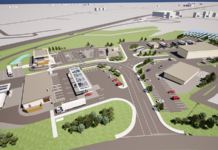
TURNER & Townsend has called for ‘agility and adaptability’ as the construction industry adjusts to the cancellation of the northern leg of HS2.
In its Winter 2023 UK Market Intelligence (UKMI) report, the professional services consultancy highlights the opportunity for other real estate and infrastructure programmes to draw on supply chain capacity that will be released following the UK Government’s decision to scale back plans on part of the high-speed rail project.
Turner & Townsend warned that ongoing economic headwinds will continue to impact the industry overall, adding that price volatility in materials, plant and equipment ‘weighs heavily’ on the sector, which is also grappling with capacity and workforce shortages.
These pressures are being counterbalanced by a ‘marked softening’ in the growth of construction activity. Output has increased by just 0.1% in the third quarter of 2023 compared with Q2, and by 2.5% over the last year. This marks the eighth consecutive quarter of growth in output, though represents a slowdown since 2022, when the sector expanded by 6.5%.
Turner & Townsend’s tender price inflation forecast for 2023 holds steady from its autumn prediction, at 3.7% for the real estate sector and 5.5% for infrastructure. Further increases of 2.7% for real estate and 4.5% for infrastructure are expected in 2024.
Despite ongoing challenges, the report points to reasons for optimism. Construction orders increased by 3.9% throughout the quarter, following three consecutive quarters of contraction. It notes the plans to divert spending from HS2 into a £36 billion investment into transport infrastructure in the north of England. The water sector is also set to invest £98 billion of upgrades between 2025 and 2030.
Digitalisation is said to provide an important avenue for the industry to prepare for future opportunities. The report points to the rail industry as a sector that is using AI to improve safety and reduce costs.
The consultancy called for clients to consider design strategies and where, against current economic uncertainty, a more traditional model of built asset investment may allow them greater control and time to monitor markets and costs. It adds that clients must re-assess how they work with their supply chain to deliver on investment.
James Darrie, strategic lead for Scotland at Turner & Townsend, said, “The full effects of Westminster’s change in tack on infrastructure remain to be seen. For now, we need to focus on the challenges at hand and make the most of programmes in planning and in flight. The construction sector remains resilient as we weather economic storms, with particular areas in real estate, such as retrofit and refurbishment, strengthening significantly.
“This is not to say that it’s smooth sailing for the sector. High interest rates and skills shortages put pressure on our capacity to deliver. Clients must remain flexible in the face of these difficulties, and continually re-evaluate the way they procure and manage their projects. Investment in digitalisation is one way that clients can get ahead.”








